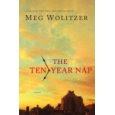 For all those who have ever stumbled, bluffed, or bullshitted their way into a job that they're supremely underqualified for...I give you Gregory Levey! Greg is a second year law student when he applies for an internship at the Israeli embassy in New York. After surmounting the predictable bureaucratic runaround (and surviving a series of hilariously random security interviews and questions) he finds himself the new speechwriter for the Israeli UN delegation. This seems a little strange; yes, he's a Jew, but he's also a Canadian citizen with zero ties to Israel. At first he can't believe his luck, but Greg soon finds that the Embassy is populated by a pack of neurotic, lazy, shiftless weirdos. For example, the librarian is the only person in the place with a lock on his door, and he spends his days screaming at invisible people behind it. The head of security is convinced that his Japanese roomate is a Syrian spy. The foreign minister can only be given speeches with sentences less than six words long, and Greg repeatedly finds himself representing Israel on the UN council at strategic meetings and votes. Did I mention he's not even Israeli?
For all those who have ever stumbled, bluffed, or bullshitted their way into a job that they're supremely underqualified for...I give you Gregory Levey! Greg is a second year law student when he applies for an internship at the Israeli embassy in New York. After surmounting the predictable bureaucratic runaround (and surviving a series of hilariously random security interviews and questions) he finds himself the new speechwriter for the Israeli UN delegation. This seems a little strange; yes, he's a Jew, but he's also a Canadian citizen with zero ties to Israel. At first he can't believe his luck, but Greg soon finds that the Embassy is populated by a pack of neurotic, lazy, shiftless weirdos. For example, the librarian is the only person in the place with a lock on his door, and he spends his days screaming at invisible people behind it. The head of security is convinced that his Japanese roomate is a Syrian spy. The foreign minister can only be given speeches with sentences less than six words long, and Greg repeatedly finds himself representing Israel on the UN council at strategic meetings and votes. Did I mention he's not even Israeli?Now, this might seem like a recipe for disaster to you and me, but Greg soon finds himself promoted...to the Prime Minister's office in Jerusalem! Of course, the madness is only heightened at headquarters, and soon Greg is reduced to slipping Seinfeld references into the Prime Minister's speeches just to keep himself sane.
A horrifying but hilarious look at the slapdash, off the cuff political structures behind the Israel we think we know.





